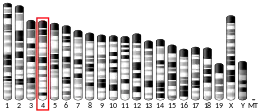MIER1
Mesoderm induction early response protein 1 is a protein that in humans is encoded by the MIER1 gene.[5][6][7]
References
- GRCh38: Ensembl release 89: ENSG00000198160 - Ensembl, May 2017
- GRCm38: Ensembl release 89: ENSMUSG00000028522 - Ensembl, May 2017
- "Human PubMed Reference:". National Center for Biotechnology Information, U.S. National Library of Medicine.
- "Mouse PubMed Reference:". National Center for Biotechnology Information, U.S. National Library of Medicine.
- Paterno GD, Ding Z, Lew YY, Nash GW, Mercer FC, Gillespie LL (Jul 2002). "Genomic organization of the human mi-er1 gene and characterization of alternatively spliced isoforms: regulated use of a facultative intron determines subcellular localization". Gene. 295 (1): 79–88. doi:10.1016/S0378-1119(02)00823-5. PMID 12242014.
- Ding Z, Gillespie LL, Paterno GD (Jan 2003). "Human MI-ER1 alpha and beta function as transcriptional repressors by recruitment of histone deacetylase 1 to their conserved ELM2 domain". Molecular and Cellular Biology. 23 (1): 250–8. doi:10.1128/MCB.23.1.250-258.2003. PMC 140656. PMID 12482978.
- "Entrez Gene: MIER1 mesoderm induction early response 1 homolog (Xenopus laevis)".
Further reading
- Paterno GD, Mercer FC, Chayter JJ, Yang X, Robb JD, Gillespie LL (Nov 1998). "Molecular cloning of human er1 cDNA and its differential expression in breast tumours and tumour-derived cell lines". Gene. 222 (1): 77–82. doi:10.1016/S0378-1119(98)00473-9. PMID 9813250.
- Nagase T, Kikuno R, Nakayama M, Hirosawa M, Ohara O (Aug 2000). "Prediction of the coding sequences of unidentified human genes. XVIII. The complete sequences of 100 new cDNA clones from brain which code for large proteins in vitro". DNA Research. 7 (4): 273–81. doi:10.1093/dnares/7.4.271. PMID 10997877.
- Matsuda A, Suzuki Y, Honda G, Muramatsu S, Matsuzaki O, Nagano Y, Doi T, Shimotohno K, Harada T, Nishida E, Hayashi H, Sugano S (May 2003). "Large-scale identification and characterization of human genes that activate NF-kappaB and MAPK signaling pathways". Oncogene. 22 (21): 3307–18. doi:10.1038/sj.onc.1206406. PMID 12761501.
- Ding Z, Gillespie LL, Mercer FC, Paterno GD (Jul 2004). "The SANT domain of human MI-ER1 interacts with Sp1 to interfere with GC box recognition and repress transcription from its own promoter". The Journal of Biological Chemistry. 279 (27): 28009–16. doi:10.1074/jbc.M403793200. PMID 15117948.
- Beausoleil SA, Jedrychowski M, Schwartz D, Elias JE, Villén J, Li J, Cohn MA, Cantley LC, Gygi SP (Aug 2004). "Large-scale characterization of HeLa cell nuclear phosphoproteins". Proceedings of the National Academy of Sciences of the United States of America. 101 (33): 12130–5. Bibcode:2004PNAS..10112130B. doi:10.1073/pnas.0404720101. PMC 514446. PMID 15302935.
- Rual JF, Venkatesan K, Hao T, Hirozane-Kishikawa T, Dricot A, Li N, Berriz GF, Gibbons FD, Dreze M, Ayivi-Guedehoussou N, Klitgord N, Simon C, Boxem M, Milstein S, Rosenberg J, Goldberg DS, Zhang LV, Wong SL, Franklin G, Li S, Albala JS, Lim J, Fraughton C, Llamosas E, Cevik S, Bex C, Lamesch P, Sikorski RS, Vandenhaute J, Zoghbi HY, Smolyar A, Bosak S, Sequerra R, Doucette-Stamm L, Cusick ME, Hill DE, Roth FP, Vidal M (Oct 2005). "Towards a proteome-scale map of the human protein-protein interaction network". Nature. 437 (7062): 1173–8. Bibcode:2005Natur.437.1173R. doi:10.1038/nature04209. PMID 16189514. S2CID 4427026.
- Nousiainen M, Silljé HH, Sauer G, Nigg EA, Körner R (Apr 2006). "Phosphoproteome analysis of the human mitotic spindle". Proceedings of the National Academy of Sciences of the United States of America. 103 (14): 5391–6. Bibcode:2006PNAS..103.5391N. doi:10.1073/pnas.0507066103. PMC 1459365. PMID 16565220.
- Olsen JV, Blagoev B, Gnad F, Macek B, Kumar C, Mortensen P, Mann M (Nov 2006). "Global, in vivo, and site-specific phosphorylation dynamics in signaling networks". Cell. 127 (3): 635–48. doi:10.1016/j.cell.2006.09.026. PMID 17081983. S2CID 7827573.
This article is issued from Wikipedia. The text is licensed under Creative Commons - Attribution - Sharealike. Additional terms may apply for the media files.



